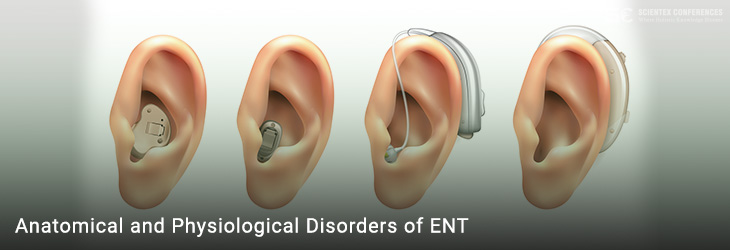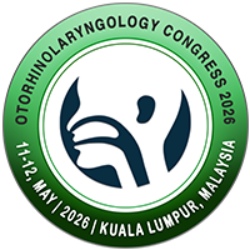Track: Anatomical and Physiological Disorders of ENT

Session Overview:
This session aims to provide an in-depth exploration of Anatomical and physiological disorders affecting the ear, nose, and throat (ENT), emphasizing their pathophysiology, diagnosis, and management. The intricate anatomy of the ENT region plays a crucial role in understanding various disorders and their implications for patient health. The session will also cover physiological disorders affecting the ENT region, including hearing loss, balance disorders, sleep apnea, and voice disorders. Attendees will learn about the underlying mechanisms of these conditions, advancements in diagnostic technologies (like audiometry and polysomnography), and contemporary treatment strategies, including the use of hearing aids, CPAP devices, and voice therapy. By the end of the session, participants will have a comprehensive understanding of anatomical and physiological disorders in the ENT field, equipping them with the knowledge to improve diagnosis, treatment, and overall patient care. This foundational knowledge will also foster ongoing discussions about research advancements and future directions in the management of ENT disorders.
Recent Developments:
Recent advancements in the understanding and management of Anatomical and physiological disorders in ENT have led to improved patient outcomes and more targeted therapeutic approaches. One of the most significant developments is the use of advanced imaging techniques, such as high-resolution computed tomography (CT) and magnetic resonance imaging (MRI), which have enhanced the accuracy of diagnosing complex anatomical disorders. These tools allow for better visualization of structures, facilitating early detection of conditions like tumors, sinus abnormalities, and congenital anomalies. In the realm of physiological disorders, emerging research has shed light on the pathophysiology of conditions such as obstructive sleep apnea (OSA) and voice disorders. Novel diagnostic modalities, including home sleep apnea testing and laryngeal electromyography, are being employed to assess these conditions more effectively. These innovations have contributed to the development of personalized treatment strategies, including tailored continuous positive airway pressure (CPAP) therapy for OSA and targeted voice therapy for individuals with dysphonia.
Sub Tracks:
Chronic Rhinosinusitis:
This sub-track will focus on the pathophysiology, diagnosis, and management of chronic rhinosinusitis (CRS). Discussions will cover the role of inflammation, potential triggers, and the impact of nasal polyps. Treatment options, including corticosteroid therapy, surgery (such as endoscopic sinus surgery), and emerging biologic therapies, will also be explored.
Otitis Media:
Examine the various forms of otitis media, including acute otitis media and chronic otitis media with effusion. This sub-track will discuss risk factors, diagnostic approaches, and treatment strategies, such as the use of antibiotics, tympanostomy tubes, and preventive measures.
Laryngopharyngeal Reflux (LPR):
Investigate the impact of laryngopharyngeal reflux on vocal health and quality of life. Topics will include the pathophysiology of LPR, diagnostic techniques (such as pH monitoring), and management strategies, including lifestyle modifications, dietary changes, and pharmacologic therapies.
Vocal Fold Paralysis:
Explore the causes, diagnosis, and treatment options for vocal fold paralysis. This sub-track will cover surgical interventions, such as vocal fold injection and medialization laryngoplasty, as well as speech therapy techniques to improve vocal function.
Nasal Polyps:
Delve into the etiology and management of nasal polyps, with a focus on their association with chronic rhinosinusitis and asthma. Discussions will include pharmacologic treatments, such as intranasal corticosteroids, and surgical options for polyp removal.
Laryngeal Cancer:
This sub-track will address the epidemiology, risk factors, and advances in the diagnosis and treatment of laryngeal cancer. Topics will include the role of imaging, histopathological evaluation, and emerging treatment modalities, including targeted therapies and immunotherapy.
Nasal Septal Deviation:
Examine the clinical implications of nasal septal deviation, including its contribution to nasal obstruction and sinusitis. This sub-track will cover diagnostic techniques, such as endoscopy, and treatment options, including surgical correction (septoplasty).
Meniere's Disease:
Investigate the pathophysiology and management of Meniere's disease, characterized by episodes of vertigo, tinnitus, and hearing loss. Discussions will include diagnostic criteria, dietary modifications, and treatment options ranging from medical management to surgical interventions for severe cases.
Scientific Highlights
- Anatomical and Physiological Disorders of ENT
- Lung Disease Airway Issues
- ENT Infections and allergies
- New treatment Advances in Otolaryngology
- Ear & Nose plastic surgery
- Endoscopic and laparoscopic ENT surgery
- Craniofacial & Facial surgery
- Otology and Neurotology
- ENT Microsurgery
- COVID 19 and ENT
- Pediatric Otolaryngology
- Speech and Swallowing Disorders
- Head and Neck Surgery
- Airway Management & Surgery
- ENT Allergies & Immunotherapy
- Surgical Techniques in ENT
- Nasal Polyposis and Biologic Therapy
- Advances in Cochlear Implants
- Recent Advances in Otorhinolaryngology
- Vertigo and Balance Disorders


